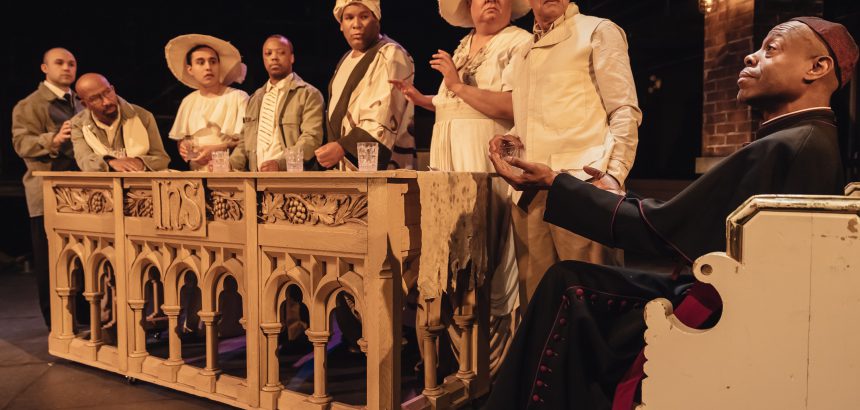When I was invited by Buddies to reflect on Lilies; I was excited. I had heard about Cole Alvis directing this work through lemonTree creations but I had never seen the original production. As I did not know the story, I made an effort to avoid reading or watching previous adaptations before attending, which allowed me to see this staging without the influence of the previous incarnations.
Lilies; Or, The Revival Of A Romantic Drama is a challenging exploration of relationship dynamics while living in the shadow of power. It is both beautiful and grotesque while forcing the audience to feel everything.
The entire production takes place within a prison chapel, with inmates acting out scenes from various characters’ collective pasts. The set design is brilliant and subtle, transforming Buddies in minor ways while exemplifying the existing architecture of the space. The actors take this environment further, immersing us completely in their world while exploring subjects that are both familiar and deeply uncomfortable.
The majority of the cast are playing prison inmates who are, at times, playing other characters. This layering in the writing forces you to consider self in proximity and was successful at forcing me to reflect upon my own position repeatedly.
Walter Borden plays the lead role of Simon Doucet and holds a commanding grasp over the audience, never breaking character even though he is often removed from the focus of what is happening on stage. He has a determined presence that carries throughout the piece, impacting all and never allowing you to truly break away from him. This could also be said for Alexander Chapman who plays the Bishop Bilodeau, although he successfully works at removing himself from the production, denying the presence of inevitable truths, while remaining on stage. For me, the relationship dynamic between the two was critical for building drama and to a degree… suspense as I consistently pondered; what are Doucet’s crimes that landed him in prison?
The exploration of relationships between characters and their various identities, cultures and backgrounds is at the core of the work as explorations of mixed blood heritage, being torn between worlds, judgements by communities, shame, anger, love, and pain are all present. The production is comprised of predominantly Indigenous and Black artists allowing for the representation of many identities to add another dimension to the text. Mark Cassius, Waawaate Fobister, Ryan G Hinds, Indrit Kasapi, Tsholo Khalema, Troy Emery Twigg, and Joseph Zita all carried themselves well, forcing you to confront their characters in various ways and as the layered construct dictates, to confront yourself in relation to them.
My family history includes both poverty and crime. This personal context added to the humanizing of people and actions presented to me greatly. I was able to make connections between actions within this work and modern-day power dynamics of governments and those vying for attention to address disparities for their people. I found myself relating to characters in various ways as I reflected on my own life, thinking about my mixed blood ancestry, my role as an advocate, and my relationships to power.
I had a great time. I enjoyed seeing so many exceptional artists exploring this work. Now that I have seen this work, I will explore the previous stage plays and film that have been produced although I must admit that now this current work has become my reference point for a successful production. The level of cultural representation, consideration, care, and talent presented has inspired me to want to explore it further.
production photo by Jeremy Mimnagh
set design by Jay Havens
costume design by Joanna Yu
lighting design by Michelle Ramsay


